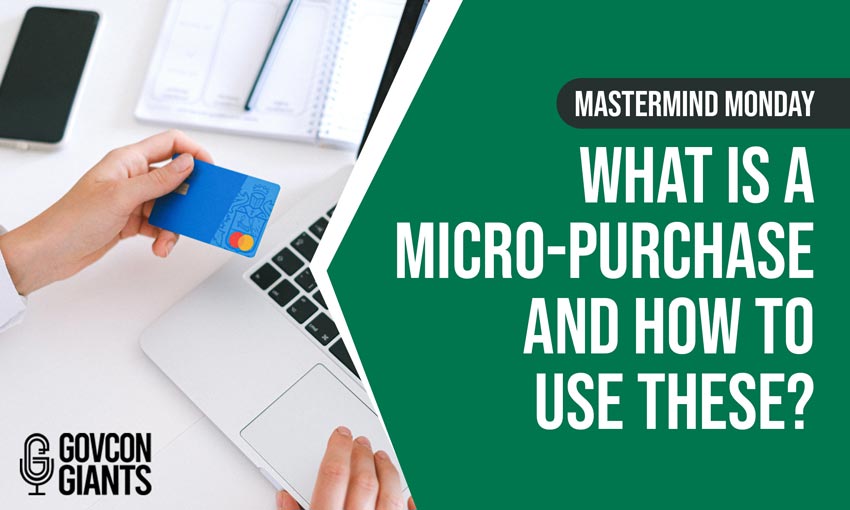Learn how to prepare for your call and get invited back in this blog highlight of our second Mastermind Monday video!
GETTING THE FEDERAL BUYER’S ATTENTION IS NOT EASY
Winning contracts in the federal marketplace is a long cycle and it can really be disheartening for the folks who never experience success because they expect something to happen in the first few months.
As Carrie Fisher said, “Instant gratification takes too long,” and if that resonates with you, then the federal market is not your happy place.
Why is this? Because getting your federal buyer’s attention is not easy. The federal buyer needs to trust you.
“All the contract door openers in the world can’t do that, if you haven’t done the work to win and earn the real trust.”
With this in mind, you need to consider the fact that getting in a meeting with the federal buyer is just the first step, the real win is to get invited back.
So, how can you stay committed and stay engaged in the effort of winning the federal business when nothing seems to happen for the longest time? Continue reading this blog.
THE FEDERAL BUYER DOESN’T RETURN MY CALL
When someone doesn’t return your calls, our brains start to make up answers that they’re not interested in your product or they have already found other people, among other things.
However, the only reason is if they didn’t call you back. Until you talk to them, you have no way of knowing what happened to your inquiries.
“The only thing you can know when your federal buyer is not returning your calls is that they didn’t return your calls.”
Remember, in a really distracted universe, when everybody and everything is vying for your attention, it can take 15 to 30 instances to get from contact to contract.
THINGS TO DO TO GET THE FEDERAL BUYER’S ATTENTION
1. Think in very human terms.
When somebody is trying to sell you something, but they don’t know about you and your company, what would you feel?
Remember, we are humans, and so are your federal buyers; so grasp the concept of thinking generously in very human terms about the person you’re trying to reach.
“If you’re too busy to learn about your federal buyer, they sure don’t have time to learn about you.”
2. Experiment.
It can take from 15 to 30 instances to get from contact to your first contract, so don’t just stop after a few call.
With this, you also need to consider experimenting how you communicate with them and what time of the day.
Remember, as business owners, we are open to take calls every time, so let’s also consider that towards our federal buyer.
3. Dress the part.
Are your online profiles well-alined? Is the information about your business the same as it was written in the SAM database?
Consider that your average federal buyer checks you out 12 times online before they have the first contact with you, so if your online profiles are not aligned, that might be the reason they don’t respond to your calls.
Remember, you want to be taken seriously as a federal contractor, so you should dress for the occasion and this includes your online wardrobe.
“When you’re showing off in the federal arena, your electronic wardrobe also matters.”
4. Pay attention to customer experience.
Pay attention to the experience that you’re giving somebody when you are wooing them.
What is going on for them? How could I be of service to them? What happens when we treat marketing and sales as acts of service?
“Give somebody the quality of experience when you’re wooing them that they’re gonna start to believe that you’re going to continue to give them when they say yes.”
5. Solve small problems.
As small businesses, you might not have the huge capabilities that are needed in million-dollar contracts.
In this case, why not solve small government problems? There are state and local contract opportunities. If you are part of a set-aside, you can also do a joint venture or a partnership.
The reason why these are recommended is the fact that this can help you in improving your past performance while also letting the federal buyer learn more about you.
“Somebody who has already done business with you is more likely to do business with you again than somebody who has never heard of you.
HERE’S OUR CHECKLISTS TO HELP YOU!
Every profession has their own checklist in every process that they follow. This is also the same in meeting your federal buyer.
With this in mind, here is the checklist in every stages of the process and the things to do:
Pre-meeting
-
- Why: What are your goals? Why are you meeting with them?
- Who: Who’s gonna be there? Who’s gonna be the hosts, guests, speakers, and notetakers?
- Where: Where or what platform? What location? What facility?
- How: How will you get there? What are the security, the clearance, rehearsals needed?
- What: What are you gonna do? What is your agenda? What are the kinds of handouts you are allowed to have? What kind of equipment and media to use?
- Emergency: What are your backup plans? What will you do if the technology fails? What will you do if somebody doesn’t arrive? What would you do if you couldn’t get into the building? What would you do if the security clearance papers couldn’t get there?
Meeting day
-
- Final Checks: Check your technology and look for the point of contact upon arrival.
- Where: Use the necessary transportation and arrive ahead of time.
- Who: Sign-in sheets are really important. Know who’s in the room.
- What: Set up something that you can deliver in 10 minutes and consider the 60% of your time for Q&A, discussions, and engagement.
- How: Relax. Your federal buyer is just human. Be grateful and show empathy.
Follow-up
- Who: Have an internal and agency debriefing.
- What: Send what you said you would.
- When: Send it when and how you said you would.
- How: Send follow-up in a thorough manner and with gratitude.
RESOURCES
No one is entitled to a federal contract, but you can earn the federal buyer’s trust. So, continue building their trust and wait for the response that will yield more contracts!
“I remember another story about calling them. Calling, calling, and calling. And finally when they needed me, they called me more than I called them.”
If you want to learn more about how to prepare for your call and get invited back, then check our full Mastermind Monday video with Judy Bradt.
You can also visit the GovCon Giant website or the new GovCon Edu where you learn everything about government contracting!
How to prepare for your call and get invited back with Judy Bradt


